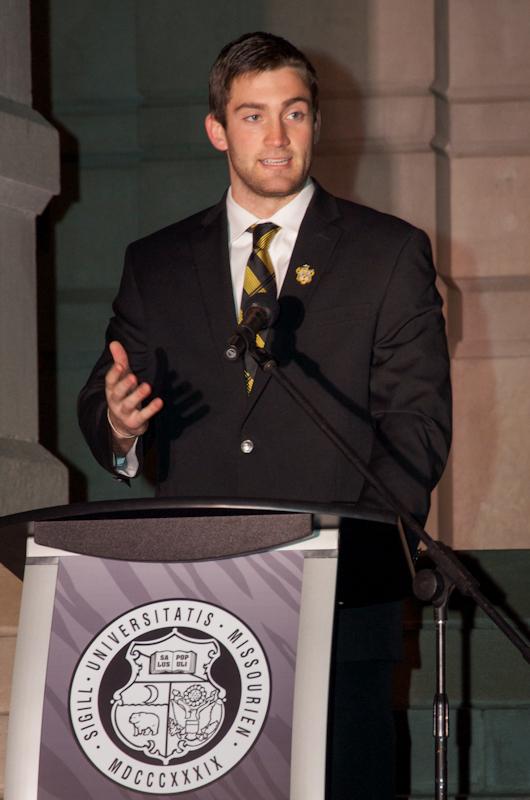The two-month Missouri Students Association presidential election came to a close Wednesday night when Tyler Ricketts, the Board of Election Commissioners chairman, announced Nick Droege and Zach Beattie as the next MSA president and vice president.
The slate won by a landslide with 84 percent of the total votes.
“I can’t tell you how much it means that (students) chose us,” Droege said to the crowd gathered outside Jesse Hall.
For an election with more than one candidate, Droege/Beattie had the highest margin of victory in five years, which is as far back as the BEC’s online records go, Ricketts said.
MSA presidential slates running against other slates typically win by around 40 percent: Xavier Billingsley/Helena Kooi won by 44 percent in 2011, Eric Woods/Emily Moon won by 40 percent in 2010, Jordan Paul/Colleen Hoffman won by 42 percent in 2008, according to the BEC. Tim Noce/Danielle Bellis ran unopposed in 2009.
During the three-day election, 5066 students voted, 4257 of which voted for Droege/Beattie. The polls opened at 6 p.m. Monday and closed at 6 p.m. Wednesday.
Spencer Maass and Shelby Catalano came in second place with 430 votes, 8 percent of the total votes.
“The loss was disappointing but understanding because of the infractions,” Maass said. “We were optimistic but (the infractions) hindered our ability to really compete.”
Tom Wright and Bo Mahr came in third place with 379 votes, 7 percent of the total.
Wright said although the loss is tough, he believes Droege and Beattie will do a good job in their newly elected positions.
Maass said he also believes Droege and Beattie will do a good job because they are both dedicated people.
After the announcement, Droege and Beattie said the moment felt surreal.
“I’ve just never felt so supported by the people around me,” Beattie said. “The people who came out and said they supported us just blew my mind.”
Alongside the public support they received, Droege said the campaign proved how well he and Beattie work together.
Droege said the entire campaign experience was stressful and tiring, but most importantly fun.
Now, the two are planning for the work ahead of them.
Droege said his and Beattie’s term will be a “surge for services” that will provide equality for students from all different socioeconomic backgrounds.
Their first plan is creating a timeline to accomplish their goals, Beattie said.
They are also going to begin planning their cabinet, Droege said. He added that they plan to talk to and collaborate with the other slates because he thinks the other slates had valid ideas during the campaign period.
“We (who ran) all have the same mission to represent the undergraduate voices,” Droege said to the crowd.
Wright and Mahr are not sure what their future plans are, but are open to working with the two, Wright said.
“If (Droege and Beattie) reach out to us to work on a certain issue, we would be more than happy to work with them,” he said.
Maass was also receptive of Droege’s offer. He said he would like to work with the slate to achieve their goals and to improve Mizzou Wireless, one of his and Catalano’s campaign goals.
Although Droege and Beattie want to work with the other slates, they both said they want to continue talking to students.
“We’re not going to slow down,” Beattie said.
This election was not only a major win for Droege and Beattie, but it was also the second-highest MSA voter turnout in the past five years: 4881 students voted in 2008, 998 voted in 2009, 4183 voted in 2010 and 5596 voted in 2011, according to the BEC.
“It’s important students realize that student government plays a role in their daily lives,” Ricketts said.
Part of the increase in voter turnout in 2012 was due to Droege and Beattie’s campaign efforts and student appeal, Ricketts said.
“It all comes down to how (the slates) campaign,” he said. “Nick and Zach did a good job connecting with students.”








